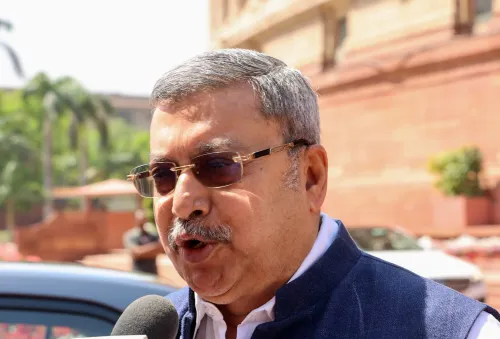How Much Did India's Coal Import Bill Drop Due to Local Production Surging in FY25?

Synopsis
Key Takeaways
- Coal imports decreased by 7.9% in FY 2024-25.
- Domestic coal production surged, resulting in significant savings.
- Government initiatives are enhancing self-sufficiency.
- Coal is essential for key industries in India.
- Challenges remain in fulfilling domestic coal demand.
New Delhi, May 27 (NationPress) India’s coal imports saw a 7.9 percent decline, totaling 243.62 million tonnes (MT) during the financial year 2024-25. This reduction was primarily driven by a boost in domestic coal production, leading to an impressive savings of $7.93 billion (Rs 60681.67 crore) in foreign exchange on the import bill, as reported by the Coal Ministry on Tuesday.
In comparison, the country imported 264.53 MT of coal in the preceding financial year.
The non-regulated sector, which excludes the power sector, recorded a more pronounced decline, with imports falling by 8.95 percent year-on-year. Despite a 3.04 percent growth in coal-based power generation from FY 2024-25 to the previous fiscal year, imports intended for blending by thermal power plants plummeted by 41.4 percent. This trend underscores India’s persistent commitment to reducing its reliance on imported coal while boosting self-sufficiency in coal production, as stated.
The Central government has introduced various measures, such as Commercial Coal Mining and Mission Coking Coal, to elevate domestic coal production and minimize imports. Consequently, coal output saw a notable 5 percent increase during FY 2024-25 compared to FY 2023-24.
India's coal industry is crucial for fueling its rapidly expanding economy, serving as a primary energy resource for vital sectors like power, steel, and cement. Nevertheless, the country grapples with a significant challenge in fulfilling domestic coal demands, particularly for coking coal and high-grade thermal coal, which remain scarce in local reserves. Thus, coal imports remain essential for meeting the requirements of key industries, including steel.
The Ministry of Coal is actively implementing strategic initiatives to bolster domestic production and ensure a stable coal supply, in line with India’s objectives of diminishing coal imports and enhancing energy security. By focusing on increasing domestic coal output, the government aims to progress towards the Viksit Bharat vision, establishing a self-sufficient, sustainable energy framework that supports enduring economic growth.









